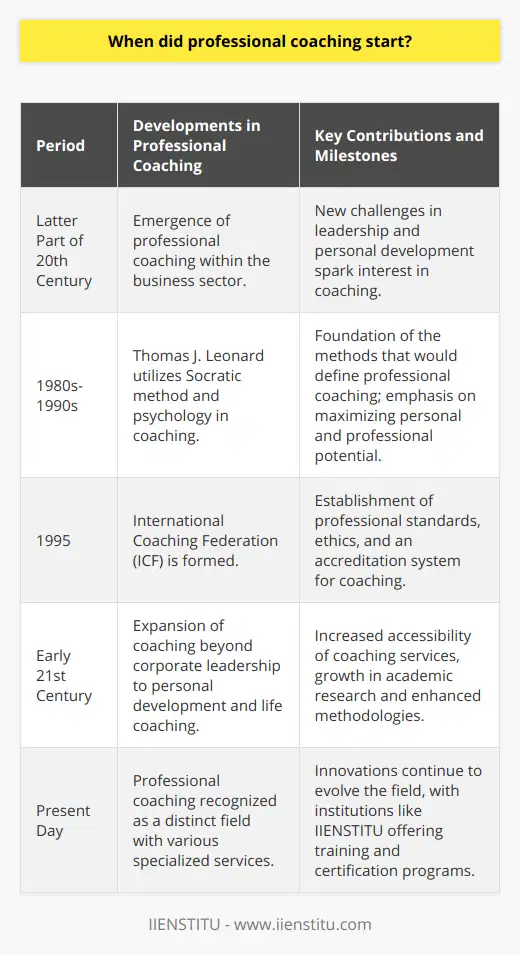
We live in a society where the individual is faced with missing their road. This can be done by seeking guidance from life coaches who will help them acquire control over shaping themselves towards fulfilling goals, but this may not always work out as planned because numerous factors could lead someone down an unexpected path forward, including Neoliberalism’s capitalistic risk factor and increasingly alienating social relations on both sides of spectrum which create uncertainty about one’s place among others.
The system has not delivered on its promises, and people feel betrayed by the government. The neo-liberal economic policies that were put in place have led to an ever-expanding gap between affluent or educated individuals who can afford luxuries like health care while others struggle just trying to cover their basic needs such as food and shelter etcetera.
Many citizens no longer believe what they are told because there is too much misinformation campaign going around from companies looking at making money off our fears instead of giving us solutions.
The monotonous and stressful life of many people is ruined by long hours in a standardized work setting, which kills creativity. However, media organs continue to encourage free lifestyles even though they can be dull or odd.
In other words, Although some may have disappointment with their regular job involving lots of same-old tasks every day, others enjoy the lackadaisical approach to doing things because it gives them more freedom.
Coaching has allowed people to explore their inner potential and tap into this newfound freedom; many are now finding a sense of empowerment.
Life coaches are in high demand as people worldwide search for ways to create a satisfying lifestyle. According to 2016 research by International Coach Federation (ICF), there were 53,300 professional coaches with $2 356 000 revenue from their businesses - mainly due to an increase of 18% compared with just one year earlier!
Last year, a report showed that this field had become quite profitable; ICFs study indicates it can be even more lucrative if you consider all levels below international management: national associations, direct coaching programs, etc.
My blog aims to investigate the reconstruction of habitus and selves within life coaching practice. In addition, I have some questions like: How do new middle-class dispositions show themselves through coaching techniques? What type of self-technology is created in processes that help individuals shape their sense of what it means ‘to be professional or coachee.’
In order to write this blog, I conducted interviews with life coaches and coachees. Additionally, books by the professionals were used as reference material for my study on one hand approach of coaching practice which is an effort aiming at transforming habits due to trouble resulting from conflicting manners among new middle-class people living in Istanbul.
The coaching habitus is an integral part of the new middle-class lifestyle. As seen in my research, it is common for people who coach others on how they should act or think thanks to their expertise with beliefs and techniques specific only toward self-development in one’s life.
I want everyone interested, not just those within this industry but also potential clients looking at becoming a coachee someday, so we can all share knowledge when possible!
What is Life Coaching?
Coaching is the art of facilitating performance, learning, and development. It helps individuals to reach their goals in certain areas by using particular coaching techniques that have been specifically designed for them, which can be very confusing but also beneficial because it gives people different options on how they want help with these issues.
There are different types of coaching, such as sports coaching, which helps athletes to improve their performance; business coaching, which helps executives and employees to achieve success in their careers; and life coaching, which helps people to find balance and fulfillment in their lives. Life coaching is a relatively new field, but it has become very popular in recent years because it can help people to overcome challenges and achieve their goals.
Life coaching is not therapy, counseling, or consulting. It is a unique form of coaching that focuses on helping people to achieve their personal and professional goals. Life coaches work with their clients to help them identify their goals, create action plans, and make changes in their lives. Life coaching is a process that helps people to achieve their goals by providing support, motivation, and accountability.
There are many different life coaching approaches, but all life coaches share the same goal: to help their clients live better lives. Life coaching is a journey that begins with a conversation. The coach and client work together to identify the client's goals, values, and areas of focus. The coach then helps the client to create a plan of action and accountability to make changes in their life.
The process of life coaching can be divided into four main stages: goal setting, action planning, implementation, and evaluation.
Goal setting is the first stage of life coaching. In this stage, the coach and client work together to identify the client's goals. The coach helps the client to clarify their goals and create a plan of action.
Action planning is the second stage of life coaching. In this stage, the coach helps the client to create an action plan. This plan includes specific steps that the client will take to achieve their goals.
Implementation is the third stage of life coaching. In this stage, the client takes action and implements their plan. The coach provides support and accountability to help the client stay on track.
Evaluation is the fourth stage of life coaching. In this stage, the coach and client review the progress made towards the goals. The coach helps the client to identify areas of improvement and make changes to their action plan.
Life coaching is a process that helps people to achieve their goals by providing support, motivation, and accountability. Life coaches work with their clients to help them identify their goals, create action plans, and make changes in their lives. If you are looking for help in achieving your goals, life coaching may be right for you.
A coach’s duty isn’t just about helping clients reach specific targets or objectives; rather than doing this alone, coaches facilitate workshops where others involved work towards common aims together as equals, so no single person feels pressured into going forward if another does not wish.
A coach’s duty isn’t just about helping clients reach specific targets or objectives; rather than doing this alone, coaches facilitate workshops where others involved work towards common aims together as equals, so no single person feels pressured into going forward if another does not wish.
This is the sort of environment that life coaching creates; a non-judgmental one in which clients feel safe to be open about their feelings and thoughts, without worrying about being ridiculed or shamed. Life coaches are people who have gone through specific training in order to learn how to listen attentively, as well as offer support and useful feedback.
Unlike therapists, life coaches do not focus on past traumas or events; rather, they work with clients in the present moment to help them make changes and achieve goals that will improve their lives going forward. This often includes working on things like building self-confidence, developing positive coping mechanisms, setting healthy boundaries, and learning how to manage stress.
If you’re struggling with making changes in your life, or you’re not sure how to move forward, a life coach could help you get unstuck and achieve your goals.
Life coaches work with people daily to help them achieve their goals in life. The general function of coaching is “the sustainment and enhancement,” which falls under personal, according to Brock’s categorization system for professionals like myself who specialize in this area (business/personal).
Life coaching is a technique that can be used to help individuals with the aspects of their lives they wish to tackle. It’s not just for career and social relations but also things such as health, spiritual satisfaction, or even parenting skills; however, it focuses more on personal transformation rather than performance improvement at work, which makes this type unique among other forms like executive coaches do (one who helps manage an organization).
The mainstay of life coaching is to empower individuals by drawing out their natural strengths and abilities so that they can create the life they want for themselves. It’s about problem-solving with a positive outlook, and it relies on three essential qualities:
1. A nonjudgmental attitude- We all know how easy it is to be our own worst critic. Constantly passing judgment on ourselves only creates negative feelings and makes it harder to move forward. A life coach accepts you as you are and provides support while you work towards making changes in your life.
2. Active listening skills- In order to help you achieve your goals, a life coach needs to understand what you want to achieve. Active listening involves paying attention to what you say, both verbally and nonverbally. This includes things like body language and tone of voice. A life coach will also ask questions to clarify your goals and help you gain a better understanding of the steps you need to take to achieve them.
3. The ability to provide helpful feedback- Life coaches are not there to tell you what to do; rather, they guide you in making your own decisions. They will offer suggestions and resources, but it’s up to you to decide what actions you want to take. A good life coach will give you honest feedback that is tailored to your individual needs.
If you’re considering working with a life coach, it’s important to find someone who you feel comfortable with. This is a person you will be sharing personal information with, so it’s important to find someone who you feel safe with and who has the qualities that are important to you. When looking for a life coach, ask about their experience, training, and approach to coaching. Also, be sure to ask about their confidentiality policy and what you can expect from working together.
Working with a life coach can be a transformational experience that helps you achieve your goals and improve your life. If you’re ready to make changes in your life, a life coach could help you get unstuck and achieve your dreams.
Life coaches work with clients to help them achieve their personal goals in all aspects of life. Some experts say that it’s just about developing individual well-being and performance through the changing of certain attitudes, while others maintain “life coaching” covers more than simply improving one’s career or parenting skills; instead, this term should be thoughtfully defined by what you want out your sessions - do they have anything specific?
In general, terms though, there seems little doubt when we look at how many people are seeking professional guidance today because.
Although there is some confusion about what life coaching actually entails, it seems that most people can agree on at least one thing-the goal. Life coaches are interested in helping individuals without diagnosable psychological problems to achieve their goals with assistance from a facilitative relationship between themselves and each client/coachee they work alongside throughout the process of improvement.
In spite of or perhaps because this conflict is arising primarily due to a lack of clear definition within standard medical terms, many professionals have nonetheless continued offering these services regardless.*
As a result of this, it is then often left to the discretion of the provider to determine what constitutes life coaching and how to properly provide these services.
This ambiguity has led some coaches to develop their own unique definitions in order to help distinguish themselves from other providers offering similar services with different titles.
In this way, many see life coaching as more about finding one’s passion and meaning in life than simply reaching tangible milestones.
For others, the focus is on providing accountability and support for clients as they work to achieve specific goals within a set timeframe.
The bottom line is that there is no single answer to the question "what is life coaching?" It depends on who you ask and what they hope to gain from the experience.
No matter what your definition of life coaching may be, the process usually follows a similar format.
Most coaches will begin by assessing their client's current situation, looking at both their strengths and weaknesses.
From there, they will work with the client to set realistic goals and develop a plan for achieving them.
The coach will then provide support and guidance as the client works to implement the changes they have decided to make.
If you are thinking about working with a life coach, it is important to find someone whose approach aligns with your personal needs and goals.
When meeting with potential coaches, be sure to ask about their training, experience, and confidentiality policy.
You should also have a clear idea of what you hope to achieve from the coaching relationship before you commit to working with anyone.
If you are ready to make changes in your life, a life coach could help you get unstuck and achieve your dreams. Life coaches work with clients to help them achieve their personal goals in all aspects of life. If you're looking for a life coach, ask about their experience, training, and approach to coaching. Also, be sure to ask about their confidentiality policy and what you can expect from working together. A life coach could help you transform your life and achieve your goals.
Life coaching is a process that helps people identify their goals and create a plan to achieve them. The process usually begins with an assessment of the client's current situation, looking at both their strengths and weaknesses. The coach will then work with the client to set realistic goals and develop a plan for achieving them. The coach will provide support and guidance as the client works to implement the changes they have decided to make. If you're thinking about working with a life coach, it is important to find someone whose approach aligns with your personal needs and goals. When meeting with potential coaches, be sure to ask about their experience, training, and confidentiality policy. You should also have a clear idea of what you hope to achieve from the coaching relationship before you commit to working with anyone. A life coach could help you transform your life and achieve your goals.
Life coaches are there to help people with their goals. They work towards making positive changes in the lives of others, which is why they have so much patience and time for raking over old coals when it doesn’t benefit you directly or even make any sense at all! Life coaches will also assess your current situation and help you to set realistic goals that you can achieve. They will provide support, guidance and accountability as you work to implement the changes you have decided to make. If you are thinking about working with a life coach, be sure to ask about their experience, confidentiality policy and what they think you could realistically achieve. You should have a clear idea of what you want from the coaching relationship before committing to anyone. Life coaching could help you transform your life and achieve your goals!
Life coaches fight against negative beliefs that hinder success by converting prohibitory thoughts into good values—this takes effort because oftentimes, these conversions don’t come easily no matter how hard someone tries. Life coaches also assess their client's current situation and help set realistic goals. After that, they provide support, guidance, and accountability as the client works to implement changes. If you're thinking about working with a life coach, be sure to ask about their experience and confidentiality policy. You should also have a clear idea of what you hope to achieve from the coaching relationship before committing to anyone so that you can get the most out of life coaching.
A life coach is a professional who helps people make positive changes in their lives. Life coaches work with clients to assess their current situation, set goals, and develop a plan to achieve those goals. The coach will provide support and guidance as the client works to make the necessary changes. If you are thinking about working with a life coach, be sure to ask about their experience, training, and confidentiality policy. You should also have a clear idea of what you hope to achieve from the coaching relationship before committing to anyone. A life coach could help you transform your life and achieve your goals!
Working with a life coach can help you assess your current situation, set goals, and develop a plan to achieve those goals. The coach will provide support and guidance as you work to make the necessary changes. If you are thinking about working with a life coach, be sure to ask about their experience, training, and confidentiality policy. You should also have a clear idea of what you hope to achieve from the coaching relationship before committing to anyone so that you can get the most out of life coaching!
The Framework of Coaching
The roots of coaching go back to a time when spirituality was more important than it currently is. A woman named Emma Curtis Hopkins started the New Thought movement, which sought spiritual healing through mental practices like meditation and self-improvement techniques, later developing her own way of helping people in need with these same approaches that were more psychological rather than physical or emotional.
Curious about whether this has anything to do with sports? Well, stick around because we’re going deeper into understanding how.
The mindset that humans are pieces of God and can be unfolded by forming relationships with the one trustworthy divine entity was first popularized in New Thought. This ideology went on to inspire diverse organizations which promote these guidelines in various ways today.
- For example, Anne Conway’s “blindness” theory suggests people have agency over what they see because their emotional STATES determine how much visual information enters awareness at any given moment; this idea has been linked significantly moving the power of will
Abraham Maslow was a psychologist and philosopher who sought to teach humans their true potential. He believed that many of today’s dominant psychological theories degraded humanity by reducing people to Harboring unfulfilled desires, which he opposed because it stripped them of an opportunity for self-actualization in life.
In particular, during Post World War 2 period, after significant wars had ended, populations were shocked & traumatized on both mental health front lines but also military battlefields themselves - so this idea developed called Humanistic Psychology
The followers of this viewpoint maintained that on account of restrictive social conditions, many people were unable to become developed selves with the ability for mindfulness and tenderness.
The Human Potential Movement of the 1960s was a time when people rebelled against societal norms to find themselves. This led them to search for inner peace, which they could not get from traditional sources like churches or schools, so many turned instead towards self-help groups that dealt explicitly with psychology and spirituality - two dimensions often bracketed together under “psychedelic therapy.”
The effect this minor cultural shift had on America will forever be remembered as one Substance Use Disorder that went mainstream: Prevalence rates.
The use of various techniques in an interactive way is what sets the formation-of groups that come together at training or t-group meetings. These titles refer to gatherings where people are encouraged not only to be aware of their egos and social relationships but also to find personal potential through books written by different authors with diverse backgrounds who were inspired by this idea. Phoenix Institute was founded out of its most famous being “Esalen.”
The human potential movement of the sixties and seventies started out as an optimistic attempt to understand our brains, freedoms, and possessions. But by 1978, there were many different groups with various perspectives on what it means for someone who lives in this world successfully - from survival skills training camps for people living off-grid or without electricity; to self-help books that offered little more than old school Vietnamese Zen meditation techniques (and often less); all followed up until we reached large scale events where dozens at the time would try their hand changing themselves using psychological/spiritual methods under leaderships such.
Related Course: Leadership Development Course
The New Age Movement arose in the wake of secularization and post-modernism when there was no longer an authoritative source to give instructions for life.
The transition from the Age of Pisces to Aquarius is a time when we can expect kindness and conformity in everyday life. This will be seen most prominently through astrological changes occurring around 2023, with added emphasis on these values during that year’s corresponding season (winter).
New Age thinking is a reaction against modernity and rationality. In many ways, it aims to return humans back into the spiritual world, away from our addiction to material things or machines, which have become too much in today’s life.
The New age movement exists because people want more than just money - they also need meaning through faithfulness- there must be something else beyond what can be achieved by following logic alone
This movement might be seen as an approach to “re-enchantment” of the universe by consecrating individuals with a blended code that is both religious and scientific. It has been said before, but it bears repeating: man is not only able -but also obliged-under these circumstances—to create his own world around him; he becomes God in his own right!
For many years, psychologists have been building their research and theories on disorders that are fatal to some people without being clinically diagnosed. This is because they think everyone should suffer from these problems instead of going through life feeling happy or fulfilled with what he/she has accomplished so far in order for them not to be considered ‘normal.’
The supporter’s claim goes like this: until recently, there were very few scientifically-based studies about how positivity affects an individual’s well-being; most studies focused only handfuls concerning positive psychology - which turned in negative results due to perhaps.
This is an exciting theory that points out the need to investigate, reveal and induce positive personal traits like sensitivity.
Positive psychology is a relatively new field that focuses on the study of happiness and well-being. Unlike traditional psychology, which often looks at dysfunction and illness, positive psychology seeks to understand and promote optimal human functioning. While positive psychology is still in its early stages, it has already contributed to our understanding of what makes people happy and how we can improve our lives. One key distinction in positive psychology is between pleasure and enjoyment. Pleasure is derived from more hedonistic activities that provide short-term rewards, while enjoyment comes from experiences that allow self-realization and self-development. This distinction is crucial because it helps us to understand what activities are most likely to lead to lasting happiness. By understanding the difference between pleasure and enjoyment, we can begin
The History of Coaching
The term “coach” stems originally from the name of a region in Hungary, while it gained a secondary meaning of “instructor” from the 1830s onwards. Afterward, this concept was used to qualify trainers assisting athletes in the world of sport. In the first half of the twentieth century, what is called “internal coaching” developed, referring to top executives coaching the novice ones in order to increase their work performances? Also, throughout this period, “counselors, therapists, or psychologists” began to consult business people by supporting them in terms of psychological issues. In the 1970s, a new form of coaching appeared, which is “life coaching,” consisting in helping clients identify and achieve personally.
Werner Erhard’s “Erhard Sensitivity Training” in 1971 was a watershed moment in the development of the coaching discipline. Erhard’s unique rhetoric and techniques of potential improvement marked coaching as a distinct field of endeavor and helped to raise its profile significantly. Timothy Gallwey’s 1976 book “The Inner Game of Tennis” further popularized the concept of coaching, introducing the idea of using one’s inner dialogue to improve performance to a broader audience. Today, coaching is widely recognized as a valuable tool for personal and professional development, with an estimated 1 million coaches working in the United States alone. Thanks to the pioneering work of Erhard and Gallwey, coaching is now an integral part of many people’s lives.
Gallwey’s assertion that people’s inherent troubles are the natural inhibitors of their performance is an interesting one. While it is undoubtedly true that these troubles can hold people back, I think it is important to remember that everyone has different potential. Just as some people are naturally more talented than others, some people also have more inherent troubles. The key, then, is not to focus on overcoming these troubles but instead on finding and resolving them. By doing so, we can help people to use their full potential. This, in turn, can lead to greater fulfillment both for individuals and for society as a whole. Gallwey’s core principle of coaching is an important one and one that I believe we should all strive to follow.
Thomas Leonard was an important figure in the development of coaching as a business and a specialized discipline. He drew on his experience in both accounting and coaching to create a methodology that could be applied to any issue. His work helped to establish coaching as a distinct field, separate from other forms of consulting. Today, Leonard’s work is still highly influential, and his approach has been adapted and refined by many different coaches and organizations. However, the core principles remain the same: that coaching is a process of helping people to identify and achieve their goals. Thanks to Thomas Leonard, coaching is now recognized as one of the most effective tools for personal and professional development.
In 1987, the prominent figures of the coaching sector gathered to exhibit what can be called a “coaching manifesto,” which included twelve items. Here, they particularly emphasized that coaching is a distinctive model of self-development based on the collaboration between coach and coachee. One of the most striking detection was the ignorance of coaching as a new method under the influence of a conventional and rigid mindset. The broad recognition of coaching only started in the 1990s when more people began to realize its potential in assisting human beings in achieving their loftiest goals. In other words, it broke through the stereotype that education or training only comes from formal institutes or experienced individuals. The purest form of coaching lies in its original intention, which is to help people grow.
The coaching industry has seen exponential growth since the 1990s, with the formation of numerous coaching foundations and the appearance of thousands of certified coaches around the world. This growth can be attributed to the success of pioneering organizations such as Landmark Education, founded by students of Erhard in 1991, and the International Coach Federation (ICF), founded by Thomas Leonard in 1995. The ICF is the largest coaching organization in the world and strives to standardize coaching education globally in order to ensure quality and professionalism. This has led to an increase in the legitimacy of coaching as a profession and has resulted in more significant numbers of people seeking out coaching services. With the continued expansion of the coaching industry, it is likely that even more people will benefit from its life-changing.
The ICF Global Coaching Study conducted in 2016 found that 20,000 coaches had been certified by this organization. We can therefore say there is an emerging “coaching culture” present throughout business operations and interactions today due to the penetration of coaching mentality into them.
The history of life coaching is one that has been intensely studied in recent years. It can be defined as the act or instance when an executive coach helps increase work performance by dealing with personal matters and solutions to problems within a company, although this may not always happen directly for employees’ own benefit (unless they’re looking into their career). Semi-life coaches like these try hard at making sure everything goes smoothly both inside and outside the business world because if there are issues between co-workers, then people won’t want+or need it.
Life coaches are different from other types of personal trainers because they focus on the life aspect. These individuals help their clients create a plan for them to follow in order to make changes that will lead to success rather than simply working out what exercises you should do and when
There have been many significant contributions made by people who would eventually become known as “life coaches.” The first significant figure was Leonard, who started his program called “Life creates Your Life” around this time period; it had quite an impact on future development as well! Another person worth mentioning is Jinny Ditzler - she created counseling sessions called ‘Personal Effectiveness Plan’ at her center, resulting from the unlimited beginning back 1984-85 until 1996+ Furthermore, Laura Whitworth co-founded PPCA.

Frequently Asked Questions
What is the history of life coaching?
Origins of Life Coaching
The history of life coaching dates back to the early 20th century, primarily as an amalgamation of disciplines like counseling, psychology, and business consulting. This practice initially aimed at helping individuals identify and solve personal problems and generally improve their living conditions.
Influence of Human Potential Movement
A significant milestone in life coaching history is the Human Potential Movement that emerged in the 1960s. This movement focused on self-actualization, where individuals harness their personal power to achieve their maximal potential. During this period, various workshops and trainings were developed, paving the way for the establishment of life coaching as a separate profession.
The Emergence of Thomas Leonard
In the 1980s, Thomas Leonard, a financial planner, emerged as a key figure in life coaching. His experiences with clients extended beyond financial matters, covering personal goals and achievements. In 1992, Leonard founded Coach U, one of the first institutions dedicated to providing life coaching certifications and training aspiring coaches. His work set the foundation for modern life coaching practices and helped professionalize the field.
International Coaching Federation (ICF)
Further legitimization of the profession came in 1995 when Leonard and other influential coaches founded the International Coaching Federation (ICF). Today, the ICF is the leading global organization for coaches, setting strict ethical standards and providing accreditation and certification to coaches worldwide.
Evolution of Coaching Niches
Over time, life coaching has evolved to cater to various needs and preferences, giving birth to numerous coaching niches. Examples include executive coaching, career coaching, relationship coaching, and health coaching. As a result, coaches can now specialize and offer their services to specific demographics and industries, tailoring their approach to better serve their clients.
Current State of Life Coaching
Presently, life coaching is a thriving global industry experiencing significant growth. Technological advancements have increased accessibility, allowing coaches to connect with clients easily through online platforms. Owing to its effectiveness in enhancing personal and professional development, life coaching is becoming increasingly recognized and sought after by individuals and organizations alike.
In conclusion, life coaching's rich history combines influences from various fields and evolved over the past century. It has grown from its early beginnings in the Human Potential Movement to a professional field recognized globally for its impact on personal and professional development.

Who is considered the founder of life coaching?
Founder of Life Coaching
Thomas Leonard is widely regarded as the founder of life coaching, a professional field aimed at helping individuals achieve their personal and professional goals. Leonard, an influential figure in the development of this industry, contributed significantly to its growth and recognition.
Early Career
Leonard initially began his career as a financial planner in the 1980s. Through his experiences working closely with clients, he recognized the need for a more holistic approach to their issues, which often extended beyond just financial concerns. This realization led him to introduce innovative strategies to assist clients in managing their overall lives, encompassing various aspects, such as relationships, health, and career.
Creation of Coaching Tools
By the early 1990s, Leonard had developed a set of tools and techniques designed to guide clients in their personal growth and development. His methods included various goal-setting, accountability, and self-assessment exercises, which later became the foundation of modern life coaching practices.
Establishment of Key Institutions
To further professionalize the field, Leonard founded several institutions that still play a crucial role in the life coaching industry today. Among these are the International Coach Federation (ICF), an important organization responsible for setting ethical standards and certifying coaches, and Coach University, an educational institution offering training for aspiring life coaches.
Legacy
Thomas Leonard's innovative ideas and techniques had a significant impact on the coaching profession. His pioneering work laid the foundation for life coaching to become an established and respected field, allowing countless individuals to benefit from the guidance and support of skilled coaches.
Conclusion
In summary, Thomas Leonard is considered the founder of life coaching due to his invaluable contributions in developing the essential tools and methods of the practice, as well as his establishment of important institutions within the industry. As a result, his legacy continues to influence and inspire the work of life coaches around the world.

When did coaching become a recognized profession?
Coaching as a Recognized Profession
Historical Emergence
Coaching emerged as a recognized profession in the second half of the 20th century. Although the roots of coaching trace back to ancient civilizations, the modern concept took shape through the combined influences of sports coaching, management techniques, and human potential movements in the 1970s and 1980s.
Key Milestones
In the early 1990s, coaching gained momentum with the establishment of professional associations, such as the International Coach Federation (ICF) in 1995. This global organization was instrumental in defining coaching as a profession, setting ethical standards, and promoting professional development.
Credentialing and Accreditation
The ICF introduced the first coaching credentialing program in 1999, providing a formal structure for coaching professionals to demonstrate their expertise and adhere to best practices. The accreditation process helped establish coaching as a credible profession in the eyes of the general public and corporate America.
Broad Scope of Practice
Today, coaching encompasses various sectors and specializations, including executive, business, life, and relationship coaching. This range has heightened coaching's visibility and legitimacy as a profession, expanding its reach across diverse industries and opening new opportunities for practitioners.
In conclusion, coaching became a recognized profession in the latter half of the 20th century, with significant development and expansion in the 1990s. As a profession, it has evolved remarkably, encompassing multiple disciplines and gaining credibility through the efforts of professional associations and the establishment of credentialing programs.
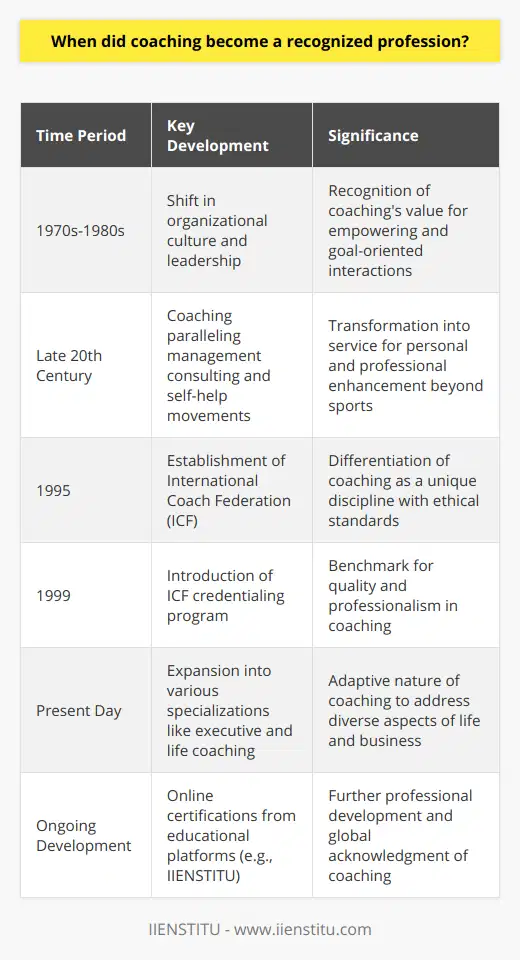
What is the origin of life coaching?
Origins in Humanistic Psychology
The origins of life coaching can be traced back to humanistic psychology, which emerged in the mid-20th century. This psychological perspective emphasizes developing personal growth and self-improvement through fostering self-awareness and facilitating meaningful choices. Pioneers such as Abraham Maslow and Carl Rogers advocated the human potential movement, laying the foundation for life coaching.
Influence of Sports Coaching
Another primary influence on the development of life coaching stems from the realm of sports coaching. The methods and techniques used by successful sports coaches were adapted to create a structured approach for achieving personal and professional goals. Tim Gallwey's 1974 book, 'The Inner Game of Tennis,' was a groundbreaking work that applied coaching principles to everyday life situations and inspired subsequent life coaches.
Evolution of Personal Development Programs
During the 1980s and 1990s, personal development programs gained momentum, further shaping the life coaching industry. Seminars and workshops focused on improving professional performance, interpersonal relationships, communication, and goal-setting. Esteemed motivational speakers like Tony Robbins pioneered unique coaching models that helped individuals transform their lives, eventually leading them to establish their life coaching businesses that still thrive today.
Formalization of Life Coaching
The International Coach Federation (ICF), founded in 1995, is a significant milestone in the history of life coaching. The ICF established guidelines, ethical standards, and credentialing systems for life coaches, distinguishing coaching from other helping professions like therapy and counseling. This formalization of life coaching as a profession has allowed for consistent training and growth within the industry in the decades since.
In conclusion, life coaching emerged from a combination of humanistic psychological concepts, sports coaching strategies, personal development programs, and the establishment of professional standards. The origins and evolution of life coaching reflect society's ongoing needs for self-awareness, personal growth, and the desire to improve one's life circumstances through proactive steps and support from expert guides.
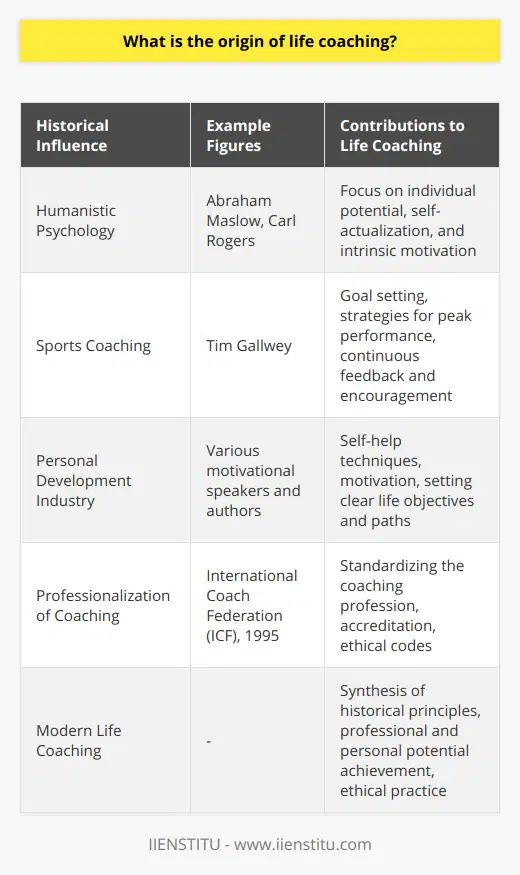
When did the life coaching industry start?
Historical Development of the Life Coaching Industry
Life coaching traces its roots back to the 19th century. In this period, counseling and mentoring-related professions emerged to guide people towards attaining success and personal growth. Some claim that its beginnings date back to the American transcendental movement, which encouraged self-reliance, spiritual exploration, and self-improvement.
Influence of Psychotherapy and Management Consultancy
The life coaching industry gained momentum after the emergence of psychotherapy and business consultancy practices in the 20th century. Specifically, in the 1960s and 1970s, cognitive-behavioral therapy and the human potential movement significantly influenced the development of life coaching techniques.
Role of Pioneering Coaches and Mentors
During the 1980s and 1990s, prominent figures such as Thomas Leonard, Laura Whitworth, and Werner Erhard contributed to the establishment and growth of the industry. They founded schools, coaching services, and development programs, which helped in professionalizing life coaching and standardizing its practices.
Expansion and Diversification
The 21st century witnessed a rapid growth and diversification of the life coaching industry. Today, it is a global phenomenon with various specializations catering to different aspects of individual and organizational development. Some of these areas include executive coaching, health and wellness, and relationships.
Growing Recognition and Regulation
The life coaching industry has garnered increasing recognition and credibility over the years. It has now become a well-established profession, with numerous professional associations, credentialing bodies, and ethical guidelines to regulate the field.
In conclusion, the life coaching industry has evolved significantly since the early years of its inception. Its growth and development have been shaped by the contributions and influences of various disciplines such as psychotherapy, management consultancy, and pioneering coaches. With its diverse specializations, life coaching continues to play a crucial role in personal and professional development worldwide.
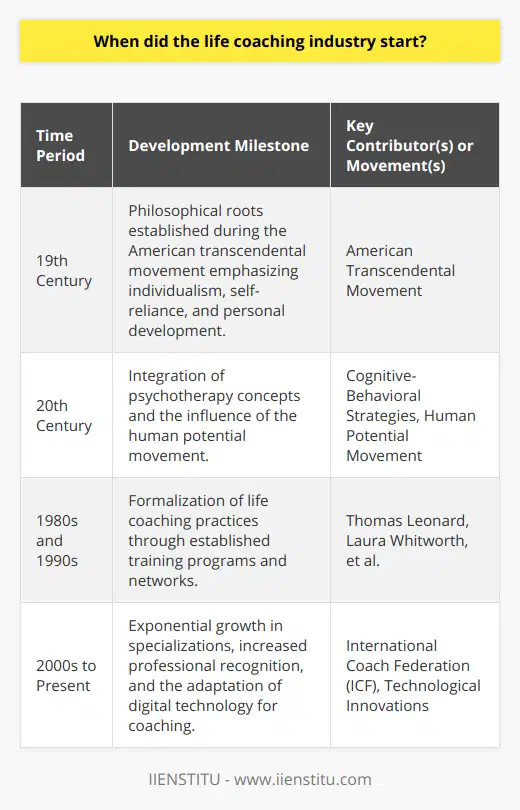
Who is the pioneer of life coaching?
Pioneering Figure in Life Coaching
The pioneer of life coaching is widely recognized to be Thomas Leonard. An innovative and groundbreaking figure, Leonard entered the coaching profession in the early 1980s, laying the foundation for a new field which has since transformed the lives of many people around the world.
Influence on the Coaching Industry
The establishment of the life coaching industry is largely credited to Thomas Leonard's tireless efforts and revolutionary ideas. Before life coaching emerged as a distinct profession, personal and professional development was mainly approached through the lens of therapy or counseling. Leonard introduced the concept of life coaching as an independent approach to helping individuals reach their full potential, encompassing personal growth, productivity, and well-being.
Creating Standards and Organizations
As a visionary, Leonard sought to ensure the credibility and longevity of the life coaching field by setting professional standards and promoting its recognition as a legitimate career. He founded the International Coaching Federation (ICF) in 1995, which remains the leading global organization dedicated to advancing the practice of professional coaching. The ICF is responsible for establishing ethical guidelines, competence standards, and certifications, ultimately helping shape the direction and credibility of the coaching industry.
Proliferation of Coaching Programs
Leonard also founded Coach U, an accredited training program for aspiring coaches, in 1992. The robust curriculum of Coach U has enabled thousands of individuals worldwide to gain coaching skills and pursue careers in life coaching. Leonard's work in founding Coach U spurred the creation of many other accredited coaching schools, fostering the growth of a thriving industry.
Long-lasting Impact
Thomas Leonard's contributions to the field of life coaching continue to shape the profession today. His philosophy and practices are deeply ingrained in the approaches and methods of contemporary life coaches, ensuring that his influence persists. As a trailblazer in the field, Leonard undoubtedly played an instrumental role in creating the life coaching industry as we know it today.
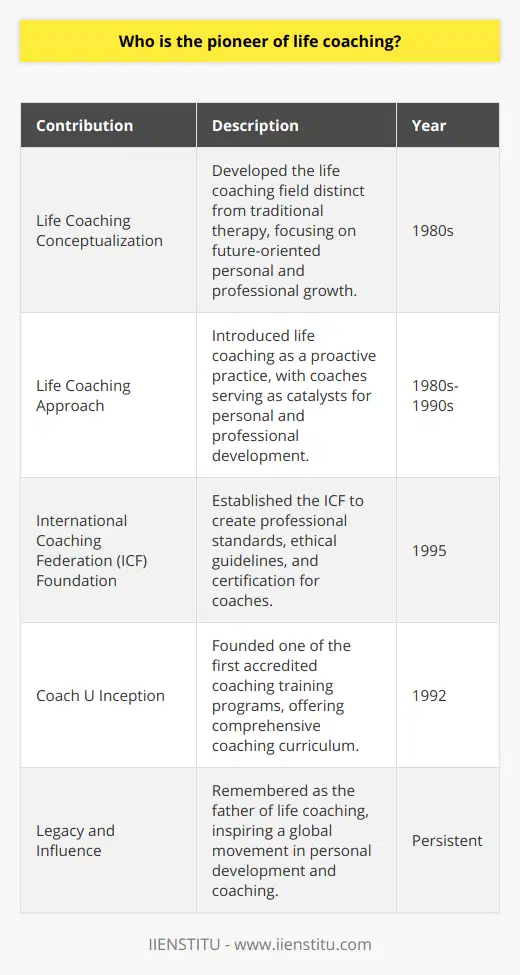
What are the primary influences that led to the development of life coaching?
Primary Influences on Life Coaching Development
Historical Context
The development of life coaching as a distinct professional field can be traced back to several primary influences. First among these is the historical context in which life coaching emerged. The profession has its roots in the human potential movement of the 1960s and 1970s, which focused on personal growth, self-actualization, and a more holistic approach to well-being. The movement acted as a precursor to what would become life coaching, encouraging individuals to explore their own potential and seek more fulfilling lives.
Psychology and Counseling Methods
Another significant influence on the development of life coaching comes from the principles of psychology and various counseling methods. Building on the work of influential figures like Carl Rogers, Albert Bandura, and Abraham Maslow, life coaching integrates concepts from different psychological schools of thought. This includes a focus on cognitive-behavioral techniques, goal-setting strategies, and mindfulness practices, all of which are geared towards promoting individual growth, self-awareness, and positive change.
Business Coaching and Organizational Development
A third major influence that led to the development of life coaching is the field of business coaching and organizational development. The growth of executive coaching in the corporate sector during the 1980s and 1990s highlighted the value of coaching for enhancing personal effectiveness, teamwork, and leadership within a professional context. This trend helped pave the way for broader interest in coaching as a means of facilitating personal development and success beyond the workplace.
Cultural Factors and Societal Shifts
Lastly, various cultural factors and societal shifts have contributed to the rise and growth of life coaching. The rise of individualism, with a focus on personal empowerment and self-improvement, as well as increasing dissatisfaction with traditional social institutions, created a demand for alternative sources of guidance and support. As people sought more tailored and personal solutions to the challenges of modern life, the popularity of life coaching grew, providing clients with practical tools and strategies for achieving their goals and navigating life's complexities.
In conclusion, the development of life coaching as a professional field has been influenced by a range of factors, including historical context, psychology and counseling methods, business coaching, and cultural shifts. Together, these influences have made life coaching an increasingly popular and sought-after service, catering to the diverse needs of individuals in pursuit of their personal and professional goals.
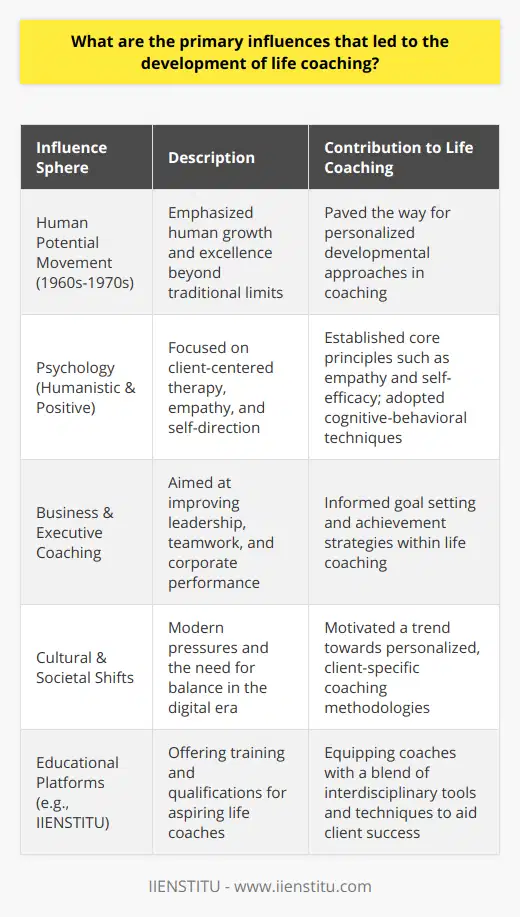
How has the field of life coaching evolved over time?
Life Coaching Origins
Initially, life coaching emerged from various fields, such as psychology, counseling, and human resources. During the 20th century, it evolved as a separate profession to address people's life improvement needs. The foundational theories of life coaching can be traced back to key contributors such as Carl Rogers, Abraham Maslow, and Viktor Frankl. These pioneers laid the groundwork for guiding individuals to realize their potential and achieve personal growth.
Expansion and Methods
In the 1980s and 1990s, life coaching became more mainstream, thanks to the work of influential figures like Thomas Leonard and Tony Robbins. These individuals popularized coaching techniques that focused on goal-setting, mindset shifts, and habit formation. As a result, life coaching evolved from primarily self-help and motivation approaches to more comprehensive models, incorporating aspects like emotional intelligence, mindfulness, and neuroscience. Technology has also played a significant role in the expansion of life coaching, as online platforms now facilitate remote coaching sessions, increasing accessibility and convenience for clients.
Certification and Regulation
As the field continued to grow, the need for greater structure and professionalism became evident. The International Coach Federation (ICF) established in 1995, remains one of the most prominent governing organizations for life coaching. The ICF introduced core competencies, credentialing, and ethical standards, thus legitimizing life coaching as a credible profession. Several other organizations, such as the International Association of Coaching (IAC), have since followed suit, offering certifications and ongoing education opportunities for coaches.
Niche Specialization
Over time, life coaching has diversified into various specializations to cater to clients' unique requirements. Executive coaching, wellness coaching, and career coaching are just a few examples of niche specializations that have emerged from the broader field of life coaching. Coaches now specialize in specific areas to help their clients address challenges unique to those domains, leading to more targeted and effective results.
Conclusion
In summary, the field of life coaching has evolved significantly over the past century. The discipline's origins in psychology, counseling, and human resources have given way to an expansive, diverse, and professional industry that addresses clients' various personal and professional goals. The intersection of technology, research, and specialized coaching approaches has allowed the field to continue growing and adapting to best serve individuals seeking support in navigating their unique life paths.

What are the key principles that guide the practice of contemporary life coaching?
Understanding Life Coaching Principles
Contemporary life coaching is guided by several key principles that enable coaches to effectively support clients in reaching their goals and realizing their full potential. These principles form the foundation of the coaching process, ensuring it is empowering, solution-focused, and client-centered.
Client Autonomy and Empowerment
A core principle of life coaching is the belief in the client's inherent capacity for personal growth, self-discovery, and decision-making. Coaches act as facilitators, offering guidance and tools, but ultimately respecting and promoting the client's autonomy in determining their path.
Goal and Solution Orientation
Life coaching is fundamentally action-oriented, focusing on helping clients identify measurable goals and create actionable strategies to achieve them. By concentrating on solutions, coaches enable clients to develop a forward-thinking mindset and overcome barriers to success.
Collaborative Relationship
Life coaches collaborate with clients in a supportive partnership, fostering an environment of trust, respect, and open communication. This relationship allows coaches to understand their clients' needs, challenges, and motivations, while clients gain valuable insights and feedback.
Holistic Approach
Contemporary life coaching acknowledges the interconnectedness of various aspects of an individual's life. By adopting a holistic approach, coaches can offer more comprehensive and sustainable solutions tailored to the client's unique situation, values, and aspirations.
Confidentiality and Ethics
Adherence to ethical standards, including confidentiality, is crucial in life coaching. Coaches must respect clients' privacy, maintain professional boundaries, and act with integrity to promote a safe and trusting coaching environment.
Continual Reflection and Learning
Life coaching is an ongoing process of growth and development for both clients and coaches. Coaches, therefore, must engage in continual reflection, professional development, and training to enhance their skills and stay current with best practices in the field.
In conclusion, contemporary life coaching is guided by several key principles that emphasize the client's autonomy, the importance of goal-setting and solutions, a collaborative relationship, a holistic approach, ethical standards, and the ongoing development of coaching skills. The understanding and application of these guiding principles help life coaches deliver effective and impactful support to their clients.

What were the early influences on the growth of the life coaching profession?
Early Theories and Concepts
The early influences on the growth of the life coaching profession can be traced back to various theories and concepts in psychology, philosophy, and management. One of the foundational theories, the humanistic approach in psychology, emphasized the importance of self-actualization and personal growth, and thus contributed to the development of life coaching. Specifically, the work of psychologists Abraham Maslow and Carl Rogers played a vital role in shaping the profession, promoting the idea that individuals possess an inherent tendency to grow and achieve their potential.
Evolution of Self-help
Another early influence on life coaching came from the self-help movement of the late 20th century. Authors such as Wayne Dyer, Tony Robbins, and Stephen Covey popularized the idea of personal development through their best-selling books and seminars, introducing millions to techniques aimed at improving their lives. These self-help gurus paved the way for the professionalization of life coaching, as people increasingly sought experts who could provide personalized guidance and support for attaining their goals.
Advent of the Internet
The growth of the life coaching profession was also greatly influenced by the technological advancements of the 1990s and early 2000s, particularly the advent of the internet. The worldwide web provided coaches with a platform to reach a global audience, as well as offering clients the opportunity to access a wealth of self-improvement resources and connect with like-minded individuals. Moreover, the internet facilitated the establishment of professional life coaching organizations, such as the International Coach Federation, which played a crucial role in standardizing and legitimizing the profession.
Influence from Business and Sports
Finally, the growth of the life coaching profession was fuelled by its early associations with the business and sports sectors. Executive coaching, which focuses on developing leadership skills and enhancing organizational performance, demonstrated the potential of coaching techniques for achieving positive outcomes. In addition, sports coaching methodologies, particularly those emphasizing the value of setting clear goals and fostering motivation, served as a model for the emerging discipline of life coaching. The success of these approaches in enhancing individual and group performance showcased the benefits of tailored guidance and support, which helped to popularize the concept of life coaching as a distinct profession.
In conclusion, the early influences on the growth of the life coaching profession can be attributed to a combination of theoretical underpinnings from psychology, the popularity of self-help literature, advances in technology, and successful applications in the business and sports fields. These factors converged to lay the groundwork for the establishment of life coaching as a recognized and valuable profession in the realm of personal development.

How have various psychological theories and approaches contributed to the development of life coaching methodologies?
Theoretical Foundations
Life coaching methodologies have significantly benefited from various psychological theories, particularly in understanding human behavior, motivation, and cognition. These theoretical frameworks have provided essential tools for life coaches to better assist their clients in reaching their goals.
Humanistic Approach
One significant contribution comes from the humanistic approach, which emphasizes self-actualization, personal growth, and human potential. Life coaching models like the GROW (Goals, Reality, Options, and Will) model and the Wheel of Life have their roots in humanistic psychology (Whitmore, 2009). These tools promote self-awareness, empowerment, and positive change in clients, essential components of effective coaching practice.
Cognitive-Behavioral Approaches
Cognitive-behavioral approaches have also influenced life coaching methodologies. Cognitive-behavioral coaching (CBC) is an example of implementing these frameworks to help clients identify and change maladaptive thoughts and behaviors (Neenan & Dryden, 2001). By using cognitive, emotional, and behavioral strategies, coaches can guide clients to adjust their mindset, overcome challenges, and achieve desired outcomes.
Positive Psychology
Positive psychology has played a significant role in shaping life coaching practices. With its focus on human flourishing, strengths, and well-being, this field has offered valuable insights and tools for coaches to create positive change (Seligman, 2011). For example, the PERMA model, which represents five aspects of well-being (Positive emotion, Engagement, Relationships, Meaning, and Achievement), provides a useful framework for coaches to facilitate personal growth and build resilience among clients.
Neuroscience
Lastly, recent advancements in the field of neuroscience have provided a deeper understanding of brain functioning, leading to the development of neurocoaching. Neurocoaching integrates brain-based strategies for enhancing cognitive processes, such as memory, attention, and emotion regulation (Rock, 2006). This approach offers practical tools for coaches to help clients enhance their mental performance, leading to more effective decision-making and problem-solving.
In conclusion, life coaching methodologies have significantly evolved by drawing upon various psychological theories and approaches. Approaches such as humanistic psychology, cognitive-behavioral coaching, positive psychology, and neuroscience have provided valuable frameworks and tools which have ultimately shaped and enriched coaching practice. As research continues to advance in these fields, life coaching methodologies will likely continue to refine and adapt to better serve clients in achieving their goals.

What is the significance of the four pillars of life coaching in shaping the overall coaching practice?
Significance of the Four Pillars
The four pillars of life coaching, namely self-awareness, self-regulation, empathy, and motivation, are crucial for shaping the overall coaching practice. These elements play a significant role in fostering an individual's holistic personal and professional development, as well as enhancing the effectiveness of the coaching process.
Understanding Self-Awareness
Self-awareness enables coaches to acquire a deeper appreciation of their clients' needs, values, beliefs, and emotions. This critical understanding promotes confidence and clarity in their objectives, which in turn, enables them to better facilitate self-discovery procedures during coaching sessions. Moreover, self-awareness equips coaches with the ability to communicate more effectively, ensuring that they establish strong relationships with their clients.
Importance of Self-Regulation
Incorporating self-regulation techniques into coaching practices allows coaches to manage their emotions and reactions within the context of their clients' experiences. This critical skill aids them in remaining unbiased and composed, ensuring that they maintain an objective perspective throughout their sessions. Furthermore, self-regulation contributes to a positive coaching environment, as it permits the coach to create a safe space for clients to express their concerns and explore their potential.
Emphasizing Empathy
Empathy is essential in facilitating open and candid communication between coaches and clients. By fostering an empathetic approach, coaches can cultivate a nonjudgmental and supportive environment, encouraging clients to express their thoughts and emotions freely. Empathy also enables coaches to tap into their clients' underlying needs, allowing them to create more meaningful relationships and develop personalized coaching strategies.
Cultivating Motivation
Motivation serves as a driving force in the coaching practice, as it empowers clients to set realistic goals, take action, and maintain the momentum needed to achieve their desired outcomes. Coaches are responsible for instilling motivation in their clients, which can be done through various techniques such as goal setting, accountability, and providing constructive feedback. Thus, motivation is an integral component that fuels the coaching process, promoting overall progress and positive change.
In conclusion, the four pillars of life coaching significantly impact the overall coaching practice, as they establish a solid foundation for the development of the coach-client relationship. By incorporating self-awareness, self-regulation, empathy, and motivation, coaches ensure a comprehensive approach to coaching that addresses clients' unique needs and delivers transformative results.
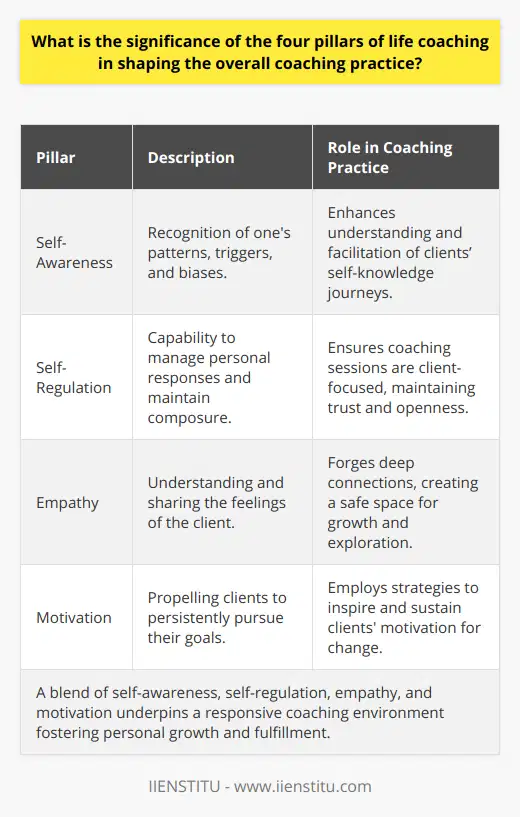
Who is the father of life coaching?
The Origins of Life Coaching
The inception of life coaching can be traced back to Thomas Leonard, an American financial planner, who is widely recognized as the father of life coaching. Leonard's contribution to the field is evidenced by his innovative methods and instrumental role in shaping the life coaching industry.
Thomas Leonard's Vision
In the early 1990s, Leonard shifted his focus from financial planning to personal development and saw a need for a new profession that would help individuals achieve their goals and aspirations. He established the International Coach Federation (ICF) and the Coach University, two pivotal organizations that set the foundation for the thriving life coaching industry.
Impact on Professional Coaching
Under Leonard's guidance, coaching practices evolved from a loosely defined mentoring process to a structured, goal-oriented approach. He also played a crucial role in establishing ethical guidelines for life coaching, setting industry standards for this burgeoning profession. Today, the ICF has become the leading global organization, accrediting over 20,000 coaches across 120 countries.
Legacy of Thomas Leonard
Thomas Leonard's work in life coaching has created a lasting impact on personal development and has fostered a global community of professional coaches. His vision has paved the way for the growth of a dynamic industry that continues to offer valuable guidance for individuals seeking personal and professional advancement.
In conclusion, Thomas Leonard is undoubtedly the father of life coaching, given his significant contributions to the development of this profession. His innovative approach and the establishment of key organizations have indelibly shaped the landscape of coaching and continue to influence practitioners worldwide.
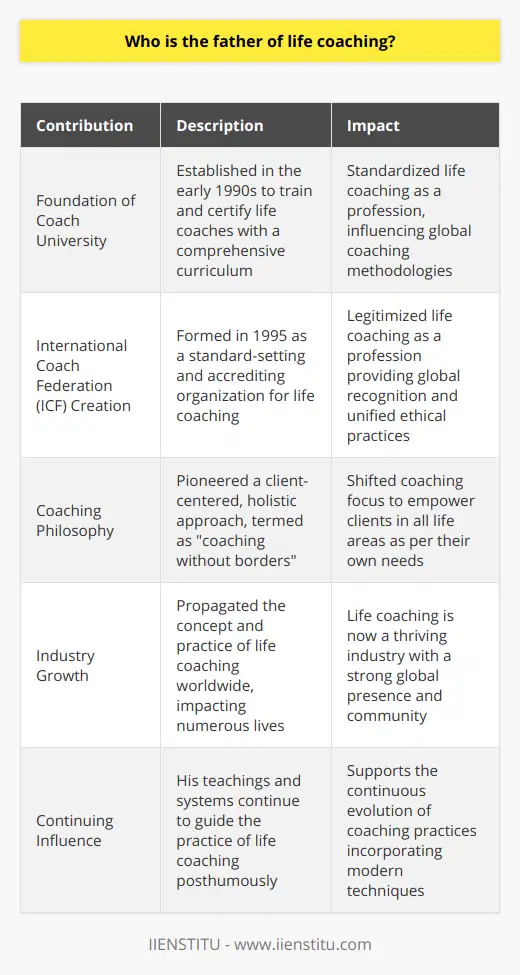
What are the 4 pillars of life coaching?
**Foundational Principles of Life Coaching**
Life coaching is an empowering profession that aims to guide individuals in living purposeful and fulfilling lives. Central to this profession are four key principles, commonly referred to as the four pillars of life coaching. These pillars encompass the core components of the life coaching process and serve as a foundation for personal growth.
**Goal-Setting and Clarity**
The first pillar of life coaching is goal-setting and clarity. Life coaches assist clients in identifying specific goals and developing a clear vision of their desired outcomes. This process encourages clients to explore their dreams, aspirations, and the paths to achieve them. Furthermore, coaches help clients define tangible objectives, fostering a sense of accountability and confidence as they pursue their goals.
**Developing Strategies and Plans**
The second pillar focuses on developing strategies and plans. Life coaches guide clients in creating a comprehensive and actionable plan to accomplish their identified goals. By breaking the goals into smaller, manageable tasks, clients can monitor their progress and adapt their strategies accordingly. This process empowers individuals to implement effective methods that facilitate achievement and lasting change.
**Unlocking Potential and Overcoming Obstacles**
The third pillar centers on unlocking potential and overcoming obstacles. Life coaches serve as catalysts for personal transformation by helping clients recognize their inherent abilities and strengths. They work collaboratively with clients to identify possible barriers and devise solutions to overcome these challenges. This pillar emphasizes the importance of self-awareness and growth in realizing one's full potential.
**Support and Accountability**
The fourth and final pillar emphasizes support and accountability. An essential aspect of life coaching involves providing clients with the necessary encouragement and motivation to persevere towards their goals. This includes building a supportive environment, celebrating successes, and addressing setbacks in a constructive manner. Additionally, coaches hold clients accountable, ensuring that they remain focused and committed to their objectives.
In conclusion, the four pillars of life coaching - goal-setting and clarity, developing strategies and plans, unlocking potential and overcoming obstacles, and support and accountability - form the foundation of this transformative profession. These key principles guide coaches as they facilitate clients' personal growth, promote self-awareness, and empower individuals to lead fulfilling lives.
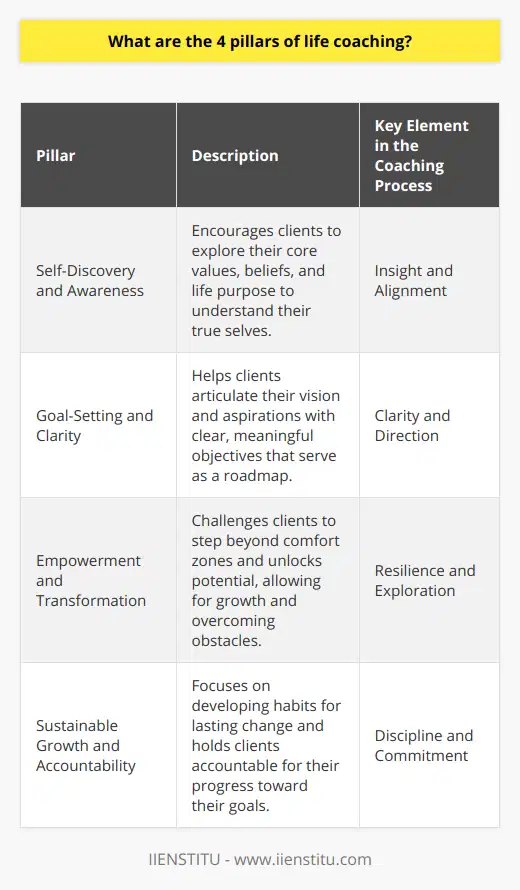
When did professional coaching start?
The Origin of Professional Coaching
Professional coaching traces its roots back to the 1970s and 1980s. During this period, the field of management consulting blossomed, as organizations sought guidance to navigate the increasingly competitive business world. Key thought leaders in this field, such as Peter Drucker, pioneered techniques to improve productivity and effectiveness in companies.
Socratic Tradition in Coaching
One of the foundational coaching models, which emerged in the late 1980s, was influenced by the Socratic tradition of questioning. Thomas J. Leonard, known as the 'Father of Coaching,' recognized the power of questions to unlock an individual's potential. He combined these Socratic techniques with modern theories of human behavior and motivation, setting the stage for the emergence of professional coaching.
International Coaching Federation
Further contributing to the growth of professional coaching was the establishment of the International Coaching Federation (ICF) in 1995. The ICF's mission was to advance the coaching profession by setting high standards, providing independent certification, and building a global network of professional coaches.
Rapid Expansion in the 21st Century
Since the 2000s, professional coaching has experienced exponential growth, evolving beyond the business and executive sectors to encompass personal and life coaching arenas as well. The coaching profession now benefits from extensive research, specialized training programs, and sophisticated tools, which are embraced by a diverse range of industries and applications.
In conclusion, professional coaching emerged as a distinct field in the late 20th century, drawing upon the rich traditions of management consulting, Socratic questioning, and psychological theory. The establishment of the ICF as a regulatory body and the rapid expansion of the industry in the 21st century have solidified coaching as a respected and valuable profession.
